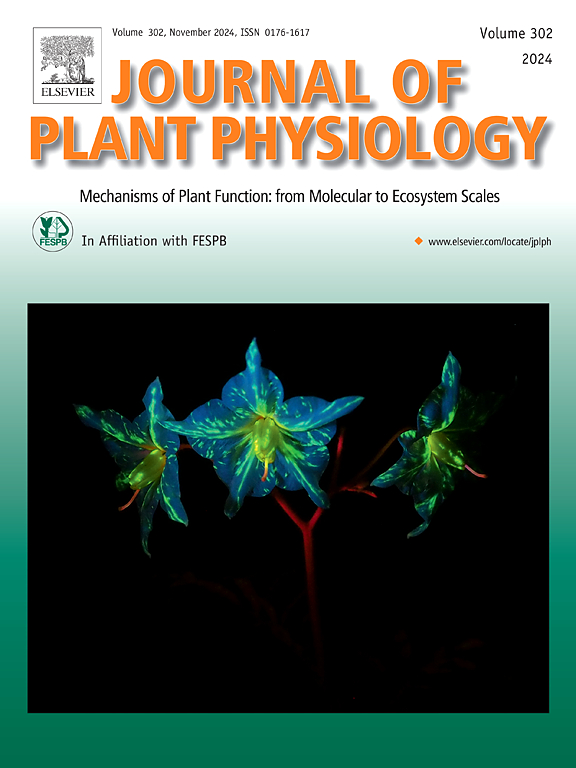Melatonin improves aluminum tolerance in soybean through modification of cell wall and vacuolar compartmentalization of aluminum
IF 4.1
3区 生物学
Q1 PLANT SCIENCES
引用次数: 0
Abstract
Aluminum (Al) toxicity has a significant adverse impact on plant growth and crop yield. Melatonin (MT) is involved in plant responses to various environmental stresses. However, the role of MT in mitigating Al toxicity remains largely unknown in soybean (Glycine max L.). In this study, the findings indicate that MT application alleviates Al-induced root growth inhibition and reduces Al accumulation in the cell wall. MT application under Al stress decreased the pectin and hemicellulose 1 content in the root tip cell wall and increased pectin methyl esterification, leading to reduced Al binding in the cell wall fractions. Additionally, MT treatment under Al stress inhibited lignin synthesis in the root tip cell wall, thereby alleviating the increased rigidity of cell wall and promoting its expansion. Furthermore, MT application under Al stress modulated the expression of Al transport-related genes (GmCDT3, GmNrat1, GmIREG3 and GmALS1), reducing cytoplasmic Al accumulation and enhancing vacuolar Al sequestration. Taken together, these findings suggest that MT mitigates Al toxicity in soybean by reducing Al deposition in the cell wall and enhancing Al sequestration in the vacuole. This study offers clues for enhancing crop resistance to Al toxicity in acidic soils.
褪黑素通过改变细胞壁和铝的空泡区化来提高大豆对铝的耐受性
铝(Al)毒性对植物生长和作物产量有显著的不利影响。褪黑素(MT)参与植物对各种环境胁迫的反应。然而,MT在大豆中减轻Al毒性的作用在很大程度上仍然未知(Glycine max L.)。本研究结果表明,施用MT可减轻Al诱导的根系生长抑制,减少Al在细胞壁的积累。铝胁迫下施用MT降低了根尖细胞壁中果胶和半纤维素1含量,增加了果胶甲基酯化反应,导致细胞壁组分中Al结合减少。此外,铝胁迫下MT处理抑制了根尖细胞壁中木质素的合成,从而减轻了细胞壁刚性的增加,促进了细胞壁的膨胀。此外,在铝胁迫下施用MT可调节铝转运相关基因(GmCDT3、GmNrat1、GmIREG3和GmALS1)的表达,减少细胞质中铝的积累,增强空泡中铝的固存。综上所述,这些发现表明,MT通过减少铝在细胞壁的沉积和增强铝在液泡中的封存来减轻大豆中的铝毒性。本研究为酸性土壤中增强作物抗铝毒性提供了线索。
本文章由计算机程序翻译,如有差异,请以英文原文为准。
求助全文
约1分钟内获得全文
求助全文
来源期刊

Journal of plant physiology
生物-植物科学
CiteScore
7.20
自引率
4.70%
发文量
196
审稿时长
32 days
期刊介绍:
The Journal of Plant Physiology is a broad-spectrum journal that welcomes high-quality submissions in all major areas of plant physiology, including plant biochemistry, functional biotechnology, computational and synthetic plant biology, growth and development, photosynthesis and respiration, transport and translocation, plant-microbe interactions, biotic and abiotic stress. Studies are welcome at all levels of integration ranging from molecules and cells to organisms and their environments and are expected to use state-of-the-art methodologies. Pure gene expression studies are not within the focus of our journal. To be considered for publication, papers must significantly contribute to the mechanistic understanding of physiological processes, and not be merely descriptive, or confirmatory of previous results. We encourage the submission of papers that explore the physiology of non-model as well as accepted model species and those that bridge basic and applied research. For instance, studies on agricultural plants that show new physiological mechanisms to improve agricultural efficiency are welcome. Studies performed under uncontrolled situations (e.g. field conditions) not providing mechanistic insight will not be considered for publication.
The Journal of Plant Physiology publishes several types of articles: Original Research Articles, Reviews, Perspectives Articles, and Short Communications. Reviews and Perspectives will be solicited by the Editors; unsolicited reviews are also welcome but only from authors with a strong track record in the field of the review. Original research papers comprise the majority of published contributions.
 求助内容:
求助内容: 应助结果提醒方式:
应助结果提醒方式:


